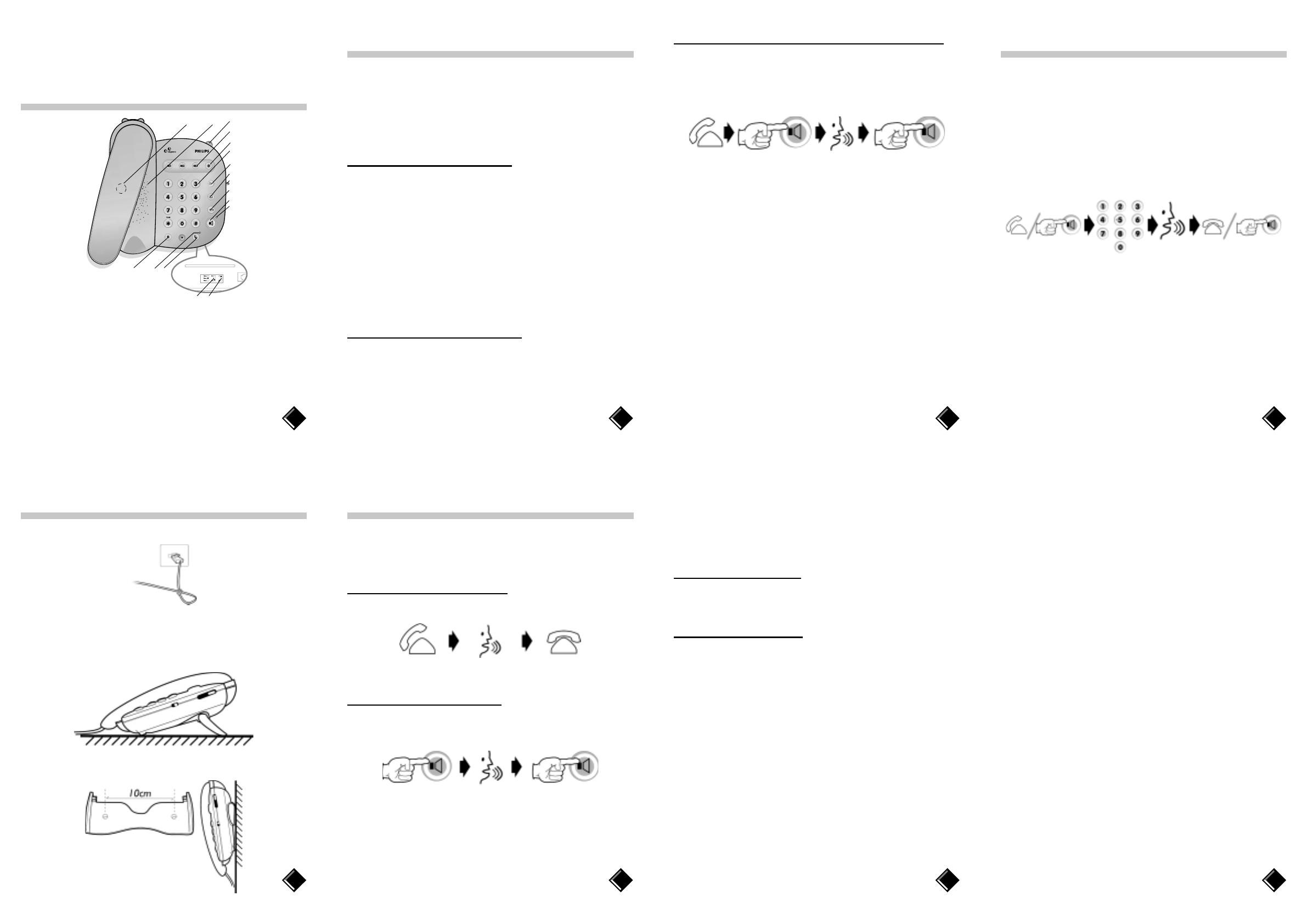
Thank you for purchasing this Philips Elegance 44 Speaker/
Telephone. Your Elegance 44 is designed with advanced state-
of-the-art technology for user-friendliness and convenience.
FEATURES OF YOUR ELEGANCE 44
1. Volume Slider
2. Direct Memory buttons
3. Store button
4. Dial Keypad
5. Ringer indicator
6. Phonebook button
7. Ringer Volume switch
8. Redial button
9. Speaker On/Off button
10. Speaker On/Off indicator
11. Speaker Mute button
12. Speaker Mute indicator
13. Recall button
14. Handset Mute button
15. Speaker
16. Tone/Pulse switch
17. TBR/ELR switch
1
2
3
4
5
6
7
8
INSTALLING YOUR ELEGANCE 44
Plug the telephone line cord into the telephone line wall socket.
1.
15.14.
2.
3.
4.
5.
6.
7.
8.
9.
10.
11.
17. 16.
12.
13.
Note: After connecting, pick up the handset and listen to the dial
tone to ensure that installation is successful. You can now
make and receive telephone calls.
Table-top support
I. SETTING YOUR ELEGANCE 44
Choosing Your Dial Mode
Elegance 44 has 2 dial modes: “tone” and “pulse”. The factory
default setting is in “pulse”, but if you are connected to an electronic
central exchange, you should use “tone” mode. For more
information, refer to your switchboard provider.
Steps to change your dial mode:
You can change your dial mode to either “tone” or “pulse” mode
by adjusting the Tone/Pulse switch at the bottom of the telephone.
Choosing Your Recall Mode
There are 2 recall modes: “Earth Recall (ELR)” and “Time Break
Recall (TBR)”. The factory default setting is in “TBR”, and the
telephone should remain in TBR setting unless it is connected to
a switchboard requiring ELR signalling. For more information,
refer to the switchboard provider.
Steps to change your recall mode:
You can change your recall mode to either “ELR” or “TBR” by
adjusting the TBR/ELR switch at the bottom of the telephone.
Wall-mount support
II. ANSWERING YOUR CALLS
When your Elegance 44 rings, you can adjust the Ringer Volume
switch to your desired ringer volume level. Adjust the Volume
Slider to your desired conversation volume level.
To answer calls by the handset:
Lift the handset. After you finish, restore the handset.
To make calls by the Speaker:
Press once the Speaker On/Off button. After you finish, press
once the Speaker On/Off button.
To change from Handset to Handsfree conversation:
1. Press once the Speaker On/Off button (Speaker On/Off
indicator will light up).
2. Restore the handset. After you finish, press once the Speaker
On/Off button.
Note: If there is an incoming call during your phone conversation,
press once the Recall button to take it. You can resume to
your previous phone conversation by pressing once the Recall
button again. For more information about the Recall feature
and TBR settings, refer to the network provider.
Latching Privacy
When you are being interrupted during your phone conversation,
you can choose not to let the caller hear about the interruption.
Although the caller cannot hear you, you can still hear your caller.
When using the handset:
Press and hold the Handset Mute button. Cancel the mute
function by releasing the Handset Mute button.
When using the Speaker:
Press once the Speaker Mute button. Cancel the mute function
by pressing once the Speaker Mute button.
III. MAKING YOUR CALLS
You can make your calls by either dialling on the Dial Keypad or
from stored memories. Adjust the Volume Slider to your desired
conversation volume level.
Note: To pause while dialling:
Your telephone may be connected to certain switchboard or
using network services that may require you to insert a pause
while making calls. To insert a pause while making calls,
press once the REDIAL button whenever required.
Keypad Dialling
1. Lift the handset or press once the Speaker On/Off button.
2. Dial the number you want to reach. After you finish, restore
the handset or press once the Speaker On/Off button.
Last Number Redialling
You can redial the last number dialled.
1. Lift the handset or press once the Speaker On/Off button.
2. Press once the Redial button. After you finish, restore the
handset or press once the Speaker On/Off button.
Note: The last number dialled can only be redialled if the Redial
button is the first key pressed after seizing the line. Otherwise,
when pressed after any keys, the Redial button will serve as
“Pause”.
Memory Dialling
There are 2 types of memory dialling: direct one-touch and indirect
dialling.
Reminder: You should have stored phone numbers into memories
before you can operate this type of dialling. For storing
phone numbers, see topic IV.
